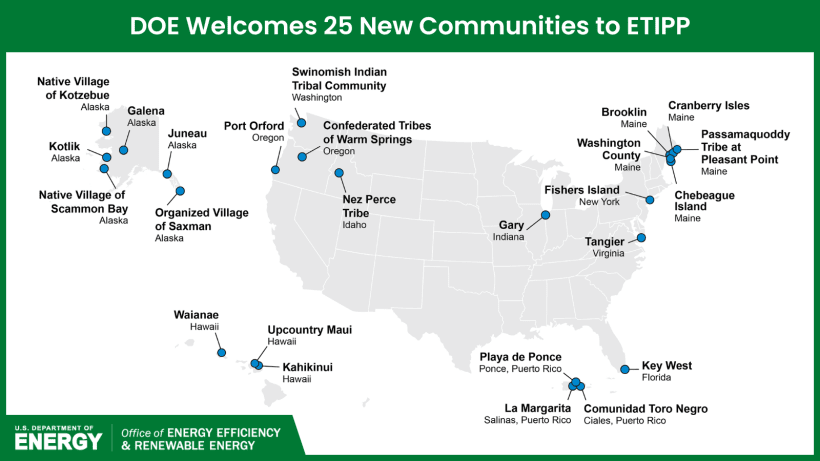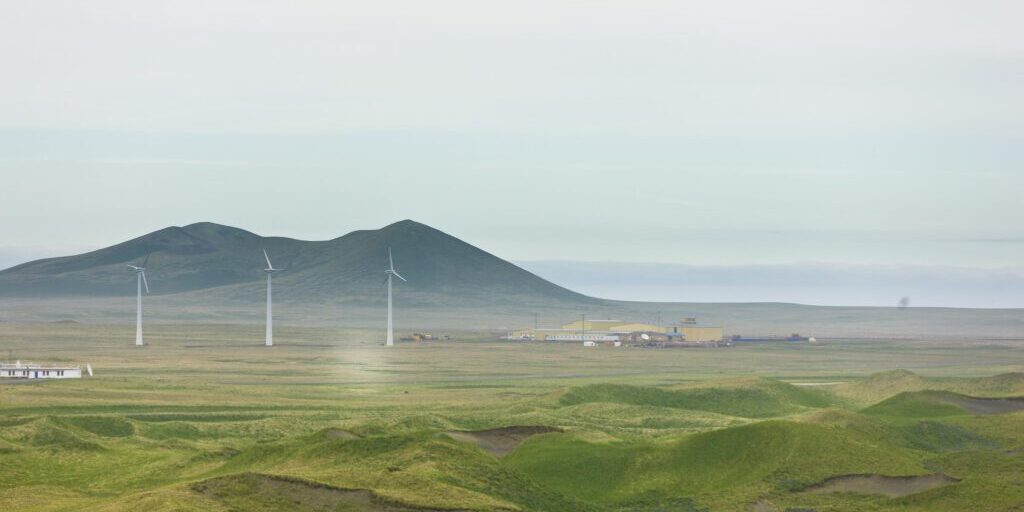Six communities across Alaska have been selected to join the latest cohort of a renewable energy program. ETIPP, the Energy Transitions Initiative Partnership Project, is funded by the U.S. Department of Energy. The project focuses on rural and island communities interested in developing renewable energy sources.
Since its inception in 2020, the DOE’s ETIPP program has supported 32 communities across the U.S. They recently welcomed 25 new communities to the program, more than double the size of last year’s cohort. According to Senior Advisor on Communities and Energy Transitions, Caroline McGregor, the push is one piece of a nationwide effort to support clean energy.
“We are trying to move towards a more decarbonized economy and decarbonized energy system, but we have to bring everyone along on that. We want to ensure that the benefits of clean energy are equitably distributed, and want to make sure no communities are left behind."
- Caroline McGregor, Senior Advisor U.S. DOE
Six communities in Alaska were selected for this year’s cohort; Galena, Juneau, Kotlik, Kotzebue, Scammon Bay, and Saxman. The communities applied earlier this year and were selected by ETIPP in the late summer. For this round, McGregor said they prioritized projects on both technical merit and need.
“There are these common threads of communities without a ton of resources trying to address these really big, complex challenges in their energy system,” McGregor said. “We prioritize communities that are historically disenfranchised or underserved by clean energy investments. Tribal communities are a great example of that.”
With their selection, each community will begin an 18-month program with ETIPP’s regional partner, Renewable Energy Alaska Project (REAP), to develop solutions fit for their unique energy needs. The program also includes virtual and on-the-ground energy education, consultation, and technical planning.

Towards the end of the program, REAP focuses on helping communities find funding sources like grants from the USDA or Denali Commission. According to REAP’s Microgrid Project Manager, Haleigh Reed, this approach ensures that communities have the resources they need to see projects through to completion.
“We're not leaving them with this plan and these models and then telling them ‘good luck’. We are also handing them the tools to take those next steps,” Reed said.
Each community has unique aspirations for the project. The Native Village of Kotzebue has set a goal of transitioning to 100% renewable energy. The Organized Village of Saxman plans to implement a tidal energy project, potentially making it one of the first in Alaska to harness energy from the ocean’s tides. In Juneau, the project will focus on the deployment of heat pumps and enhancing electric vehicle infrastructure.
The potential benefits of renewable energy sources are particularly profound in parts of the state disconnected from the Railbelt power grid. There, solutions like solar or wind power afford communities the ability to generate their own electricity year round, free from the seasonal-availability of diesel by barge.
Beyond the environmental benefits of transitioning away from diesel purchased and produced from elsewhere in the world, Reed said renewables also give tribal communities an opportunity to earn energy independence. That in turn, can benefit their economy.
“When you have tribal ownership of a project of energy generation, it could be a number of local organizations that own the project, but that money is going to stay in the community. I think that's really resonating with communities, and it's something that is building momentum in Alaska.”
- Haleigh Reed, Microgrid Project Manager, REAP
New this year is a $50,000 award to each community for time spent working on the project. McGregor hopes the funds will help participating communities stay engaged.
“The idea is to really acknowledge and recognize that there are a lot of demands on people's time, especially in small villages, people have to wear a lot of hats. $50,000 isn't all the money in the world, but it's a meaningful amount in many places, and we hope that's felt and appreciated,” McGregor said.
With this year’s cohort, 15 Alaskan communities have been selected for ETIPP since 2020. The six new additions join Igiugig, Nikolski, St. George, McGrath and Sitka in REAP’s portfolio of active projects.




